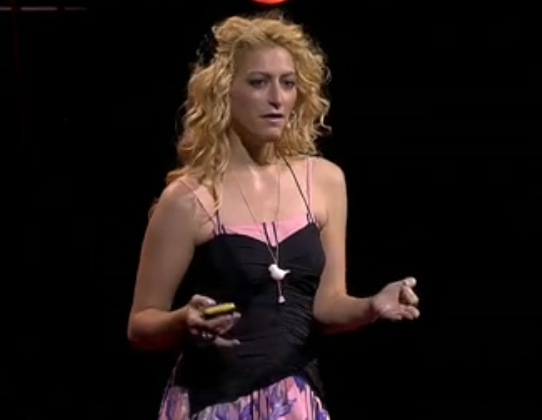And soon, I started hearing from people all over the world who were adopting their own secret identity,
在此之后我开始得到从世界各地来的反馈,他们开始选择他们自己秘密身份,
recruiting their own allies, and they were getting "super better,"
招募他们自己的盟友,他们开始变得“极了不起”
facing challenges like cancer and chronic pain, depression and Crohn's disease.
在面对挑战例如癌症、慢性疼痛、忧郁和克罗恩病时。
Even people were playing it for terminal diagnoses like ALS.
即使得了绝症像ALS的人也在玩这个游戏。
And I could tell from their messages and their videos that the game was helping them in the same ways that it helped me.
我能从他们留言和录像中看得出来游戏像减轻我的痛苦一样,减轻着他们的痛苦。
They talked about feeling stronger and braver.
他们说他们感到更变强大,更勇敢了。
They talked about feeling better understood by their friends and family.
他们说他们感觉到更容易被他们的家人和朋友理解。

And they even talked about feeling happier, even though they were in pain,
他们也谈到他们感觉到更加的快乐幸福,即使他们的疼痛还在,
even though they were tackling the toughest challenge of their lives.
即使他们应对着他们生命中最艰难的挑战。
Now at the time, I'm thinking to myself, what is going on here?
那时,我思索着,到底发生了什么?
I mean, how could a game so trivial intervene so powerfully in such serious,
我的意思是,游戏怎么可以如此有威力,当它细微的介入
and in some cases life-and-death, circumstances?
到比较严重和生死攸关情形中?
I mean, if it hadn't worked for me, there's no way I would have believed it was possible.
我的意思是,如果它对我不起作用,打死我也不信它真的有用。
Well, it turns out there's some science here, too.
但其实这也是有科学依据的。
Some people get stronger and happier after a traumatic event. And that's what was happening to us.
有的人在经历过精神创伤后,会变得更强壮和快乐。这正是我们亲身经历着的。
The game was helping us experience what scientists call post-traumatic growth, which is not something we usually hear about.
游戏使我们体验着被科学家称之为创伤后精神再生,这不是一个我们常能听到的说法。
We usually hear about post-traumatic stress disorder.
我们经常能听到“创伤后压力心理障碍症”。
But scientists now know that a traumatic event doesn't doom us to suffer indefinitely.
但现在科学家发现精神重创事件并不注定会给我们无休止的痛苦。
Instead, we can use it as a springboard to unleash our best qualities and lead happier lives.
相反,我们能用它做为跳板去发掘我们最大的潜力,从而有个更快乐的人生。



